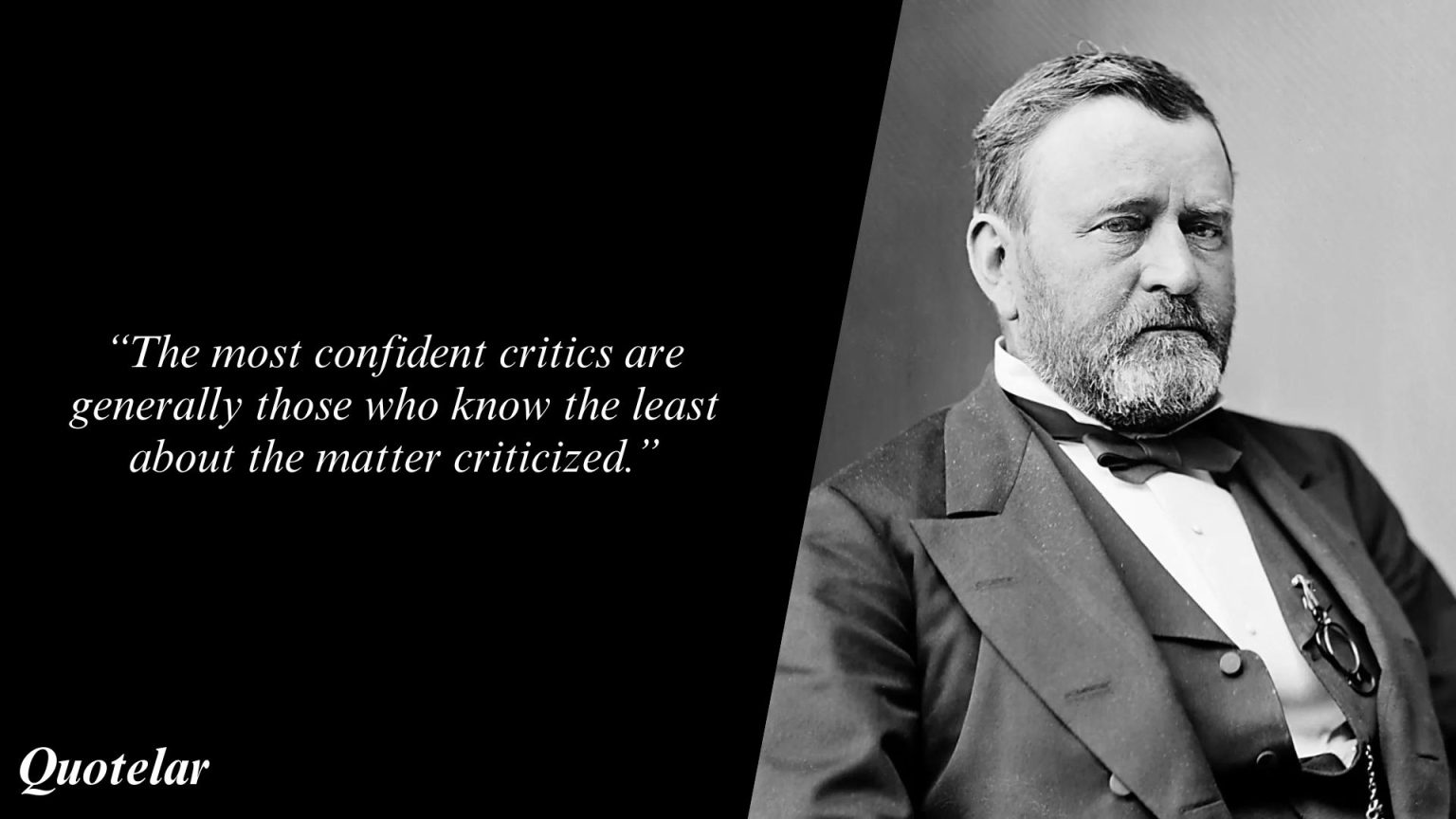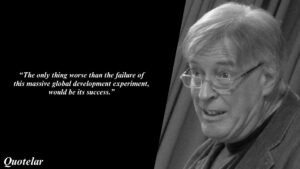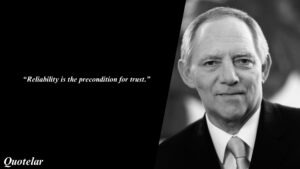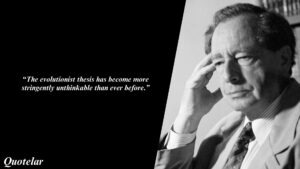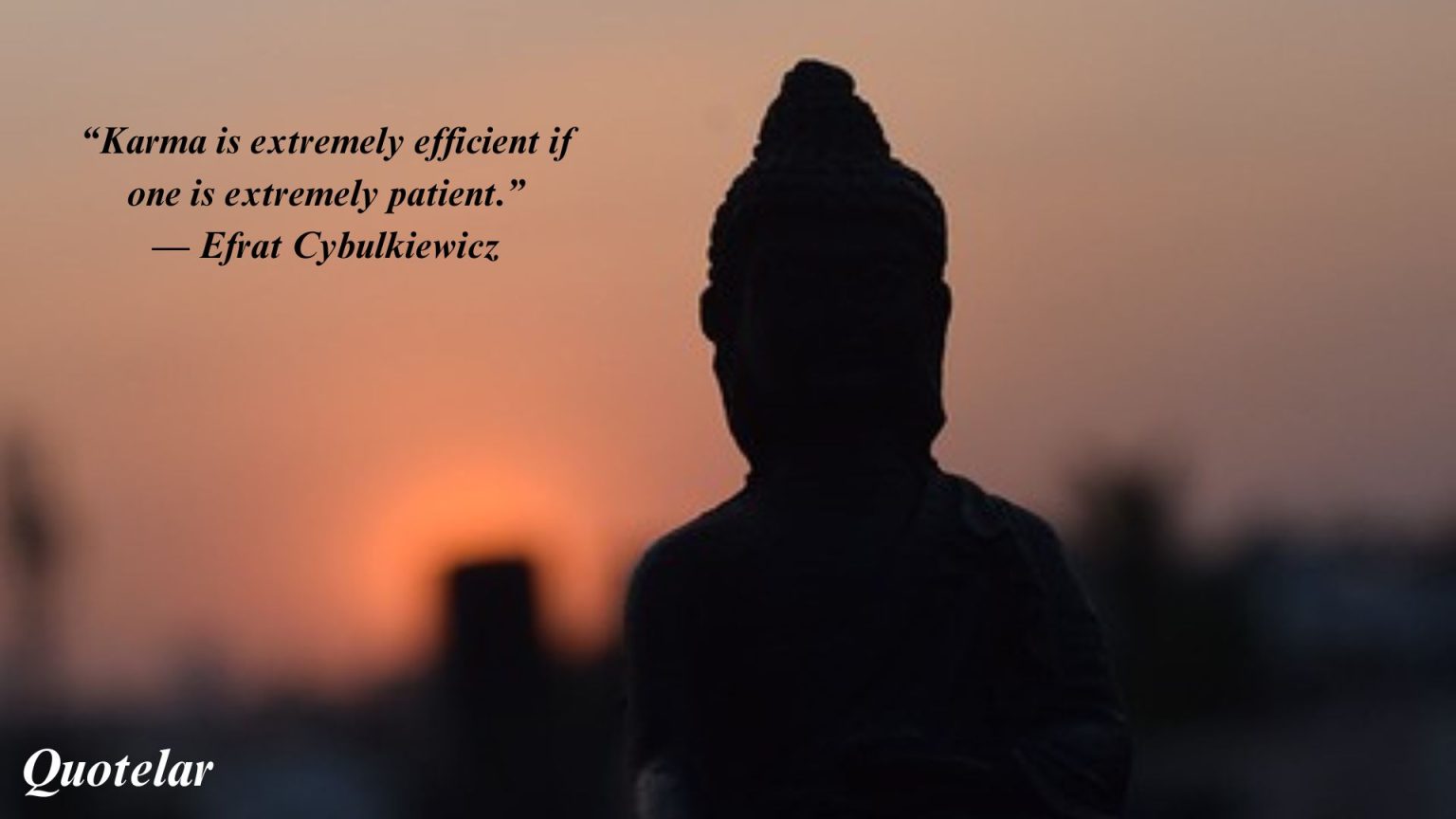Ulysses S. Grant (1822–1885) was the 18th President of the United States, renowned for his role as a Union general during the American Civil War. Born in Ohio, Grant graduated from West Point and served in the Mexican-American War. During the Civil War, he achieved notable victories, including the capture of Vicksburg and the defeat of Robert E. Lee at Appomattox Court House. Elected president in 1868, his administration faced challenges of Reconstruction and civil rights issues. Despite corruption scandals, Grant worked to protect the rights of African Americans. After leaving office in 1877, he struggled financially and wrote his acclaimed memoirs, “Personal Memoirs of Ulysses S. Grant,” before succumbing to throat cancer in 1885.
Ulysses S. Grant Quotes
1. “There are but two parties now: traitors and patriots. And I want hereafter to be ranked with the latter and, I trust, the stronger party.”
— Ulysses S. Grant
2. “In every battle, there comes a time when both sides consider themselves beaten, then he who continues the attack wins.”
— Ulysses S. Grant
3. “Hold fast to the Bible as the sheet-anchor of your liberties; write its precepts in your hearts, and practice them in your lives.”
— Ulysses S. Grant
4. “If we are to have another contest in the near future of our national existence, I predict that the dividing line will not be Mason and Dixon’s but between patriotism and intelligence on the one side, and superstition, ambition and ignorance on the other.”
— Ulysses S. Grant
5. “The friend in my adversity I shall always cherish most. I can better trust those who helped to relieve the gloom of my dark hours than those who are so ready to enjoy with me the sunshine of my prosperity.”
— Ulysses S. Grant
6. “The most confident critics are generally those who know the least about the matter criticized.”
— Ulysses S. Grant
7. “I will raid the arsenal and start a war to end slavery.”
— Ulysses S. Grant
8. “My failures have been errors in judgment, not of intent.”
— Ulysses S. Grant
9. “The fact is I think I am a verb instead of a personal pronoun. A verb is anything that signifies to be; to do; or to suffer. I signify all three.”
— Ulysses S. Grant
10. “As soon as slavery fired upon the flag it was felt, we all felt, even those who did not object to slaves, that slavery must be destroyed. We felt that it was a stain to the Union that men should be bought and sold like cattle.”
— Ulysses S. Grant
11. “God gave us Lincoln and Liberty, let us fight for both.”
— Ulysses S. Grant
12. “Quit thinking about what Bobby Lee’s gonna do to us and start thinking about what we’re going to do to him.”
— Ulysses S. Grant
13. “Hold fast to the Bible. To the influence of this Book, we are indebted for all the progress made in true civilization and to this we must look as our guide in the future.”
— Ulysses S. Grant
14. “The will of the people is the best law.”
— Ulysses S. Grant
15. “The art of war is simple enough. Find out where your enemy is. Get at him as soon as you can. Strike him as hard as you can, and keep moving on.”
— Ulysses S. Grant
16. “I suppose this work is part of the devil that is in us all.”
— Ulysses S. Grant
17. “The right of revolution is an inherent one. When people are oppressed by their government, it is a natural right they enjoy to relieve themselves of oppression, if they are strong enough, whether by withdrawal from it, or by overthrowing it and substituting a government more acceptable.”
— Ulysses S. Grant
18. “I will not move my army without onions.”
— Ulysses S. Grant
19. “Our great modern Republic. May those who seek the blessings of its institutions and the protection of its flag remember the obligations they impose.”
— Ulysses S. Grant
20. “Venice would be a fine city if it were only drained.”
— Ulysses S. Grant
21. “I have never advocated war except as means of peace, so seek peace, but prepare for war. Because war… War never changes. War is like winter and winter is coming.”
— Ulysses S. Grant
22. “It is men who wait to be selected, and not those who seek, from whom we may expect the most efficient service.”
— Ulysses S. Grant
23. “Wars produce many stories of fiction, some of which are told until they are believed to be true.”
— Ulysses S. Grant
24. “Labor disgraces no man; unfortunately, you occasionally find men who disgrace labor.”
— Ulysses S. Grant
25. “Nations, like individuals, are punished for their transgressions.”
— Ulysses S. Grant
26. “Two commanders on the same field are always one too many.”
— Ulysses S. Grant
27. “I appreciate the fact, and am proud of it, that the attentions I am receiving are intended more for our country than for me personally.”
— Ulysses S. Grant
28. “It is preposterous to suppose that the people of one generation can lay down the best and only rules of government for all who are to come after them, and under unforeseen contingencies.”
— Ulysses S. Grant
29. “I desire the goodwill of all, whether hitherto my friends or not.”
— Ulysses S. Grant
30. “It does look like a very good exercise. But what is the little white ball for?”
— Ulysses S. Grant
31. “When news of the surrender first reached our lines our men commenced firing a salute of a hundred guns in honor of the victory. I at once sent word, however, to have it stopped. The Confederates were now our prisoners, and we did not want to exult over their downfall.”
— Ulysses S. Grant
32. “My family is American, and has been for generations, in all its branches, direct and collateral.”
— Ulysses S. Grant
33. “I felt like anything rather than rejoicing at the downfall of a foe who had fought so long and valiantly, and had suffered so much for a cause, though that cause was, I believe, one of the worst for which a people ever fought, and one for which there was the least excuse.”
— Ulysses S. Grant
34. “Let no guilty man escape if it can be avoided. Be specially vigilant or instruct those engaged in the prosecution of fraud to be against all who insinuate that they have high influence to protect or to protect them. No personal consideration should stand in the way of performing a public duty.”
— Ulysses S. Grant
35. “Cheap cigars come in handy; they stifle the odor of cheap politicians.”
— Ulysses S. Grant
36. “Lee’s army will be your objective point. Wherever Lee goes, there you will go also.”
— Ulysses S. Grant
37. “Although a soldier by profession, I have never felt any sort of fondness for war, and I have never advocated it, except as a means of peace.”
— Ulysses S. Grant
38. “The Southern rebellion was largely the outgrowth of the Mexican war. Nations, like individuals, are punished for their transgressions. We got our punishment in the most sanguinary and expensive war of modern times.”
— Ulysses S. Grant
39. “If you see the President, tell him from me that whatever happens there will be no turning back.”
— Ulysses S. Grant
40. “I have made it a rule of my life to trust a man long after other people gave him up, but I don’t see how I can ever trust any human being again.”
— Ulysses S. Grant
41. “If men make war in slavish obedience to rules, they will fail.”
— Ulysses S. Grant
42. “I have never advocated war except as a means of peace.”
— Ulysses S. Grant
43. “But my later experience has taught me two lessons: first, that things are seen plainer after the events have occurred; second, that the most confident critics are generally those who know the least about the matter criticized.”
— Ulysses S. Grant
44. “I believe that our Great Maker is preparing the world, in His own good time, to become one nation, speaking one language, and when armies and navies will be no longer required.”
— Ulysses S. Grant
45. “War is progressive because all instruments of war are progressive.”
— Ulysses S. Grant
46. “Leave the matter of religion to the family altar, the church, and the private school, supported entirely by private contributions. Keep the church and state forever separate.”
— Ulysses S. Grant
47. “Everyone has his superstitions. One of mine has always been when I started to go anywhere, accomplished.”
— Ulysses S. Grant
48. “The one thing I never want to see again is a military parade. When I resigned from the army and went to a farm I was happy. When the rebellion came, I returned to the service because it was a duty. I had no thought of rank; all I did was try and make.”
— Ulysses S. Grant
49. “I would suggest the taxation of all property equally, whether church or corporation, exempting only the last resting place of the dead and possibly, with proper restrictions, church edifices.”
— Ulysses S. Grant
50. “The friend in my adversity I shall always cherish most.”
— Ulysses S. Grant
51. “There are but few important events in the affairs of men brought about by their own choice.”
— Ulysses S. Grant
52. “No other terms than unconditional and immediate surrender. I propose to move immediately upon your works.”
— Ulysses S. Grant
53. “All secret oath-bound political parties are dangerous to any nation, no matter how pure or how patriotic the motives and principles which first bring them together.”
— Ulysses S. Grant
54. “There never was a time when, in my opinion, some way could not be found to prevent the drawing of the sword.”
— Ulysses S. Grant
55. “I propose to fight it out on this line if it takes all summer.”
— Ulysses S. Grant
56. “I leave comparisons to history, claiming only that I have acted in every instance from a conscientious desire to do what was right, constitutional, within the law, and for the very best interests of the whole people. Failures have been errors of judgment, not of intent.”
— Ulysses S. Grant
57. “The distant rear of an army engaged in battle is not the best place from which to judge correctly what is going on in front.”
— Ulysses S. Grant
58. “The colored man has been accustomed all his life to lean on the white man, and if a good officer is placed over him, he will learn readily and make a good soldier.”
— Ulysses S. Grant
59. “The United States, knowing no distinction of her own citizens on account of religion or nationality, naturally believes in a civilization the world over which will secure the same universal laws.”
— Ulysses S. Grant
60. “I only knew what was in my mind, and I wished to express it clearly.”
— Ulysses S. Grant
61. “Ah, you know my weaknesses – my children and my horses.”
— Ulysses S. Grant
62. “It will be all right if it turns out all right.”
— Ulysses S. Grant
63. “I never wanted to get out of a place as much as I did to get out of the presidency.”
— Ulysses S. Grant
64. “I know no method to secure the repeal of bad or obnoxious laws so effective as their stringent execution.”
— Ulysses S. Grant
65. “I feel that we are on the eve of a new era, when there is to be great harmony between the Federal and Confederate. I cannot stay to be a living witness to the correctness of this prophecy, but I feel it within me that it is to be so.”
— Ulysses S. Grant
66. “I know only two tunes: one of them is ‘Yankee Doodle,’ and the other isn’t.”
— Ulysses S. Grant
67. “You can violate the law. The banks may violate the law and be sustained in doing so. But the President of the United States cannot violate the law.”
— Ulysses S. Grant
68. “Wherever the enemy goes let our troops go also.”
— Ulysses S. Grant
69. “Retreat? NO. I propose to attach at daylight and whip them.”
— Ulysses S. Grant
70. “Whatever there is of greatness in the United States, or indeed in any other country, is due to labor. The laborer is the author of all greatness and wealth. Without labor, there would be no government, no leading class, and nothing to preserve.”
— Ulysses S. Grant
71. “No theory of my own will ever stand in the way of my executing, in good faith, any order I may receive from those in authority over me.”
— Ulysses S. Grant
72. “The theory of government changes with general progress.”
— Ulysses S. Grant
73. “Really, Mr. Lincoln, I have had enough of this show business.”
— Ulysses S. Grant
74. “The cause of the great War of the Rebellion against the United Status will have to be attributed to slavery.”
— Ulysses S. Grant
75. “Jesse has a new dog. You may have noticed that his former pets have been peculiarly unfortunate. When this dog dies every employee in the White House will be at once discharged.”
— Ulysses S. Grant
76. “The long-continued and useful public service and eminent purity of character of the deceased ex-President will be remembered.”
— Ulysses S. Grant
77. “England and the United States are natural allies, and should be the best of friends.”
— Ulysses S. Grant
78. “I’m afraid I’m elected.”
— Ulysses S. Grant
79. “There is nothing more I should do to it now, and therefore I am not likely to be more ready to go than at this moment.”
— Ulysses S. Grant
80. “I never knew what to do with a paper except to put it in a side pocket or pass it to a clerk who understood it better than I did.”
— Ulysses S. Grant
81. “I never was an Abolitionist, not even what could be called anti-slavery, but I try to judge farely and honestly and it become patent to my mind early in the rebellion that the North and South could never live at peace with each other except as one nation, and that without Slavery.”
— Ulysses S. Grant
82. “In politics I am growing indifferent – I would like it, if I could now return to my planting and books at home.”
— Ulysses S. Grant
83. “It was my fortune, or misfortune, to be called to the office of Chief Executive without any previous political training.”
— Ulysses S. Grant
84. “There are many men who would have done better than I did under the circumstances in which I found myself. If I had never held command, if I had fallen, there were 10,000 behind who would have followed the contest to the end and never surrendered the Union.”
— Ulysses S. Grant
85. “Declare church and state forever separate and distinct, but each free within their proper spheres.”
— Ulysses S. Grant
86. “I gave up all idea of saving the Union except by complete conquest. Up to that time it had been the policy of our army, certainly of that portion commanded by me, to protect the property of the citizens whose territory was invaded, without regard to their sentiments, whether Union or Secession.”
— Ulysses S. Grant
87. “As time passes, people, even of the South, will begin to wonder how it was possible that their ancestors ever fought for or justified institutions which acknowledged the right of property in man.”
— Ulysses S. Grant
88. “I do not believe I ever would have the courage to fight a duel. If any man should wrong me to the extent of my being willing to kill him, I would not be willing to give him the choice of weapons with which it should be done, and of the time, place and distance separating us, when I executed him.”
— Ulysses S. Grant
89. “There were churches in that part of Ohio where treason was preached regularly, and where, to secure membership, hostility to the government, to the war and to the liberation of the slaves, was far more essential than a belief in the authenticity or credibility of the Bible. There were men in Georgetown who filled all the requirements for membership in these churches.”
— Ulysses S. Grant
90. “Sherman’s army, after all the depletions, numbered about sixty thousand effective men. All weak men had been left to hold the rear, and those remaining were not only well men, but strong and hardy, so that he had sixty thousand as good soldiers as ever trod the earth; better than any European soldiers, because they not only worked like a machine but the machine thought. European armies know very little what they are fighting for, and care less.”
— Ulysses S. Grant
91. “While a battle is raging one can see his enemy mowed down by the thousand, or the ten thousand, with great composure; but after the battle these scenes are distressing, and one is naturally disposed to do as much to alleviate the suffering of an enemy as a friend.”
— Ulysses S. Grant
92. “The problem for us was to move forward to a decisive victory, or our cause was lost.”
— Ulysses S. Grant
93. “To maintain peace in the future it is necessary to be prepared for war.”
— Ulysses S. Grant
94. “No political party can or ought to exist when one of its corner-stones is opposition to freedom of thought and to the right to worship God “according to the dictate of one’s own conscience,” or according to the creed of any religious denomination whatever.”
— Ulysses S. Grant
95. “The framers of our Constitution firmly believed that a republican government could not endure without intelligence and education generally diffused among the people. The Father of his Country, in his Farewell Address, uses this language: Promote, then, as an object of primary importance, institutions for the general diffusion of knowledge. In proportion as the structure of a government gives force to public opinion, it is essential that public opinion should be enlightened.”
— Ulysses S. Grant
96. “I thought how little interest the men before me had in the results of the war, and how little knowledge they had of “what it was all about.”
— Ulysses S. Grant
97. “Money expended in a fine navy, not only adds to our security and tends to prevent war in the future, but is very material aid to our commerce with foreign nations in the meantime. Money spent upon sea-coast defences is spent among our own people, and all goes back again among the people.”
— Ulysses S. Grant
98. “Whatever may have been my political opinions before, I have but one sentiment now: that is, we have a government, and laws, and a flag, and they must all be sustained. There are but two parties now: traitors and patriots. And I want hereafter to be ranked with the latter.”
— Ulysses S. Grant
99. “No political party can or ought to exist when one of its corner-stones is opposition to freedom of thought and to the right to worship God “according to the dictate of one’s own conscience,” or according to the creed of any religious denomination whatever. Nevertheless, if a sect sets up its laws as binding above the State laws, wherever the two come in conflict this claim must be resisted and suppressed at whatever cost.”
— Ulysses S. Grant
100. “It is possible that the question of a conflict between races may come up in the future, as did that between freedom and slavery before. The condition of the colored man within our borders may become a source of anxiety, to say the least. But he was brought to our shores by compulsion, and he now should be considered as having as good a right to remain here as any other class of our citizens.”
— Ulysses S. Grant
101. “The Mississippi was now in our possession from its source to its mouth, except in the immediate front of Vicksburg and of Port Hudson.”
— Ulysses S. Grant
102. “Mr. Lincoln gained influence over men by making them feel that it was a pleasure to serve him. He preferred yielding his own wish to gratify others, rather than to insist upon having his own way. It distressed him to disappoint others. In matters of public duty, however, he had what he wished, but in the least offensive way.”
— Ulysses S. Grant
103. “The great bulk of the legal voters of the South were men who owned no slaves; their homes were generally in the hills and poor country; their facilities for educating their children, even up to the point of reading and writing, were very limited; their interest in the contest was very meagre – what there was, if they had been capable of seeing it, was with the North; they too needed emancipation.”
— Ulysses S. Grant
104. “The South claimed the sovereignty of States, but claimed the right to coerce into their confederation such States as they wanted, that is, all the States where slavery existed. They did not seem to think this course inconsistent.”
— Ulysses S. Grant
105. “The State government of Kentucky at that time was rebel in sentiment, but wanted to preserve an armed neutrality between the North and the South, and the governor really seemed to think the State had a perfect right to maintain a neutral position.”
— Ulysses S. Grant
106. “These reconnoissances were made under the supervision of Captain Robert E. Lee, assisted by Lieutenants P. G. T. Beauregard, Isaac I. Stevens, Z. B. Tower, G. W. Smith, George B. McClellan, and J. G. Foster, of the corps of engineers, all officers who attained rank and fame, on one side or the other, in the great conflict for the preservation of the unity of the nation.”
— Ulysses S. Grant
107. “The copperhead disreputable portion of the press magnified rebel successes, and belittled those of the Union army. It was, with a large following, an auxiliary to the Confederate army. The North would have been much stronger with a hundred thousand of these men in the Confederate ranks and the rest of their kind thoroughly subdued, as the Union sentiment was in the South, than we were as the battle was fought.”
— Ulysses S. Grant
108. “I am not aware of ever having used a profane expletive in my life; but I would have the charity to excuse those who may have done so, if they were in charge of a train of Mexican pack mules at the time. CHAPTER VIII.”
— Ulysses S. Grant
109. “THE CAUSE of the great War of the Rebellion against the United Status will have to be attributed to slavery. For some years before the war began it was a trite saying among some politicians that “A state half slave and half free cannot exist.” All must become slave or all free, or the state will go down. I took no part myself in any such view of the case at the time, but since the war is over, reviewing the whole question, I have come to the conclusion that the saying is quite true.”
— Ulysses S. Grant
110. “The Southern rebellion was largely the outgrowth of the Mexican war. Nations, like individuals, are punished for their transgressions. We got our punishment in the most sanguinary and expensive war of modern times. The 4th infantry went into camp at Salubrity in the month of May, 1844, with instructions, as I have said, to await further orders.”
— Ulysses S. Grant
111. “I felt that 15,000 men on the 8th would be more effective than 50,000 a month later.”
— Ulysses S. Grant
